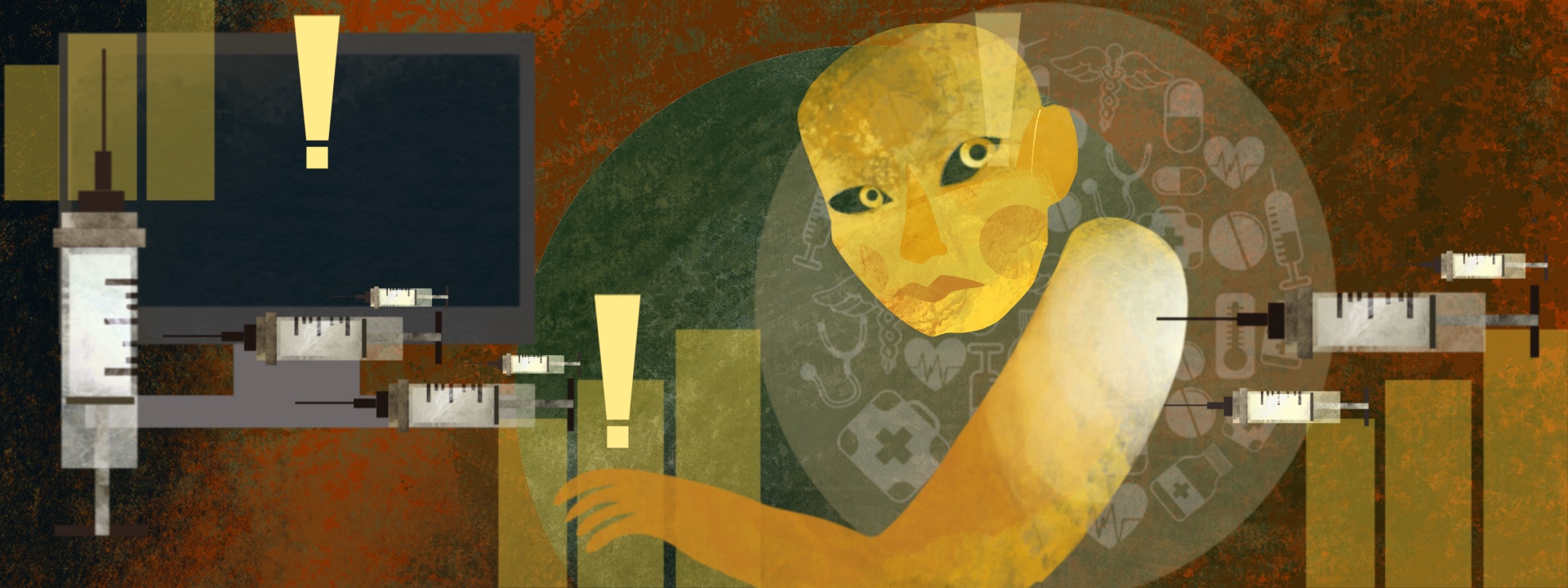Just a little more than two months ago, Pakistan was looking at a vaccination rate of 5.6%, with only 13 million out of its population of 230 million having had shots. Between mid- and end-July, however, Pakistan was able to administer more than 10 million doses and government officials now say that the country’s total number of COVID-19 vaccinations is over 40 million. That ramp up in jabs is something “superpowers have not been able to achieve,” says Federal Minister of Planning and Development and National Command and Operation Center (NCOC) chief Asad Umar. But it’s an accomplishment that the central government most probably shares with many others on the ground.
Among them would be the Haqooq-e-Khalq Movement (HKM), which has been busy conducting vaccine awareness campaigns in poor urban communities. HKM focuses primarily on rights awareness among the marginalized. But historian and activist Ammar Ali Jan, who is also an HKM member, says that it was when their work in Lahore was interrupted by the third lockdown last March that he realized how little awareness of the government’s vaccination drive had reached the communities he was working with.
“At that point, the NCOC’s campaign was only focused on Twitter, which is used by a very small percentage of the population,” he recalls. “People in these communities were not getting the vaccines, and their questions were not being answered.”

Vaccine hesitancy comes with misinformation and fear of the unknown. In Pakistan, it’s a major obstacle to the government’s vaccination drive.
The Pakistani government had announced last April that it aimed to vaccinate 70 million citizens by the end of this year. Its vaccination campaign got off on a rocky start, however, with supply shortages and mismanagement contributing to the confusion that ensued. Vaccine hesitancy also emerged as a major obstacle to the government drive; in a poll conducted in November 2020, 37% of the respondents said that they did not want to get a jab. A follow-up poll conducted by another set of researchers last May revealed that more than half of those who said they did not want to get the shots expressed wariness over the safety of the vaccines themselves. Other reasons cited were religious concerns, and the respondents’ belief that they were healthy enough to withstand the virus.
Multimedia journalist Niha Dagia meanwhile points out that vaccination rates are lower in lower-income areas due to both misinformation and lack of access. She says that in Karachi, where nearly 800,000 people have been vaccinated so far, “a closer look at the numbers shows that most vaccinated areas are the South and East districts while the lowest are Malir, Korangi, and West.”
Notes Dagia: “These are Karachi’s districts in economic order — from the most affluent to the impoverished.”
Tweets and teaching people
In Lahore, Jan and HKM began to address the apparent lack of information on the vaccines and even COVID-19 itself among the people in the communities in which they had been holding rights activities. Digital penetration is often low in these areas despite them being a part of an urban city, which is why they were not being reached by the government’s Twitter-focused drive. Jan and company thus chose to conduct a face-to-face campaign, teaming up with Nousheen Zaidi, COVID-19 researcher and Director of the Cancer Research Center.

Jan and his team’s efforts stand out because they are currently the only group engaging with communities at such a personal level. They are hoping to replicate their efforts in as many other areas that they can reach. While it was initially difficult to convince people to attend their sessions, they have now held these multiple times, which have led to a few hundred people now agreeing to get vaccinated.
The group’s initial vaccination awareness sessions were conducted in Harbanspura, Chungi Amar Sidhu, and Green Town in Lahore — communities made up mostly of informal workers earning daily wages. HKM used its contacts in these communities to set up the sessions that usually began with talks on the impact of COVID-19 and how the vaccines will offer protection against it. The basic introduction would be followed by Q&A sessions that allowed residents to express concerns and get answers to their queries. As the sessions got more popular and word spread, more people were willing to attend.
Jan noticed how many residents — particularly women — expressed vaccine hesitancy due to health concerns. “A few women came up to me to ask about whether the vaccine was safe for them as they suffered from high blood pressure,” he says. “Many of their concerns are not anything new, but they just haven’t been made aware of the benefits and need for the vaccine.”
Jan says that having Dr. Zaidi along with them proved to be a huge help because of the medical guidance she was able to offer. But Zaidi herself says that she had to rely on attention-grabbing turns of phrases to get people to understand the facts that she was sharing. She cites one example: “At one point when someone asked me if the vaccine would ensure they didn’t die. I told them, ‘Well if you stand in front of a truck after getting the vaccine, you can still die because it won’t make you immortal. But yes, it will make you safer from COVID’.”
Science vs. viral videos
Zaidi says that scientists like her are up against the formidable foe that is misinformation. Scientists have to stick to facts and data, which could be boring, she explains, while misinformation is a lot more appealing because it usually feeds on emotions, such as fear. For instance, in one COVID-19-related video that went viral, a Frenchman asserts that anyone who gets the vaccine will die within two years. Initially shared through the instant messaging platform, WhatsApp, it then continued on even across offline communities via word-of-mouth.
“We have to create a campaign that sounds more appealing than the misinformation videos being spread,” says Zaidi, adding that many misconceptions are quite common and just require that authorities take the time to clear them up and give people the information they need. She says that during HKM’s campaigns, she relied on stories and anecdotes in an attempt to make vaccine awareness more engaging and to present facts in an accessible way.
She recounts the results: “For a few sessions, we asked participants at the start on who would be willing to get the vaccine and only two to three people said they would. By the end of the session, all 60 people said they wanted to get it.”

Central and local governments have resorted to threatening citizens into getting their vaccines. The management of the government-run Pakistan Railways, for instance, has said it will not pay the salaries of employees who remain unvaccinated by the end of August.
They then took all those willing to the Walton Road vaccination center in Lahore, where both Zaidi and Jan say their participants would have had a harder time getting jabs had HKM not been there.
“Because we were there and because we had France 24 covering us for their channel, it made things easier and we were able to get it done,” says Zaidi. “But it just shows how difficult the whole process is for lower-income families.”
Aside from the confusing system at the vaccination center, Jan says that the fact that many of the residents in the areas where they conduct sessions do not have ID cards, which are required for those registering for vaccination, complicated matters. So far, HKM has been able to help residents of Harbanspura to get their ID cards made, and then guide them in using these to get vaccinated. Comments Jan: “When you don’t even have an ID card, it’s very difficult to call yourself a republic or a democracy because that’s how you participate in public life.”
In the meantime, aside from social media campaigns, both the central and local governments are now turning to threats to get as many people as possible to vaccination centers. In Sindh, the provincial government recently asked NCOC for a go-signal to block the cell phone SIMs and social media accounts of those who are still unvaccinated. In Balochistan, 70 paramilitary troops were suspended without pay after refusing their jabs. Pakistan Railways has also said it will stop paying its employees who are still unvaccinated come 31 August.
Yet there is no argument that it is only when the masses are targeted by information campaigns that national crises like the current pandemic can be kept under control, if not kept at bay. While threats and restrictions have recently caused many Pakistanis to scamper in the direction of vaccination centers, educating the masses is the obviously the better option in helping them to make the right choice.●
Anmol Irfan is a Muslim-Pakistani journalist, and founder of Perspective Magazine, an online Pakistani community platform. She hopes to champion gender equality and minority rights through her work.



















